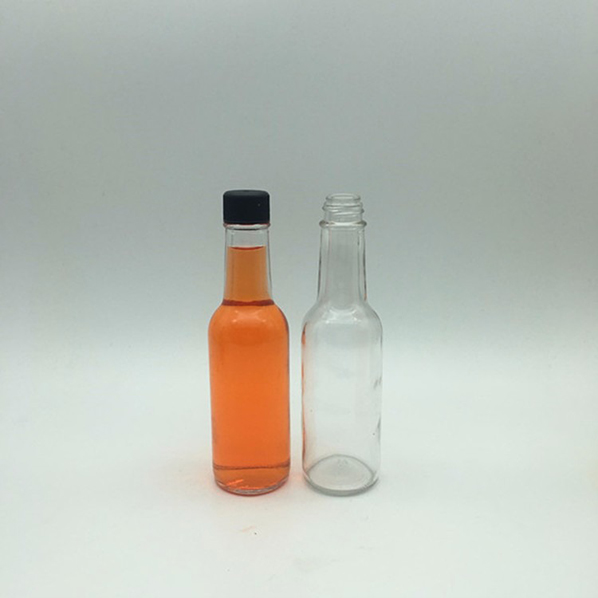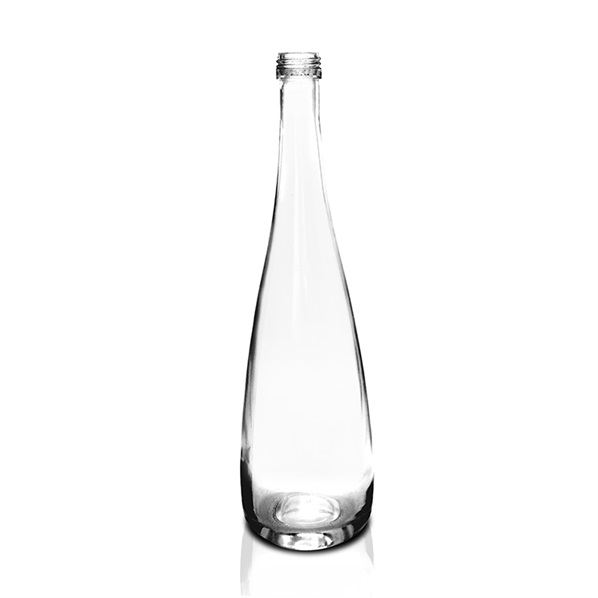Hey there, craft spirit pro or budding mixologist! So you're diving into the world of premium beverages, and those adorable, tiny glass bottles are calling your name. Whether you're launching a micro-distillery, crafting signature cocktail kits, or creating bespoke gifts, choosing the right empty mini glass liquor bottle is way more critical than just picking the prettiest one. Get it wrong, and you could face leaks, breakage, disappointed customers, and a real hit to your brand's rep. Get it right, and you elevate your product from "nice" to "must-have."
Let's crack open the secrets to selecting truly quality miniature glass bottles, ensuring your precious liquid shines – literally and figuratively.
Secret #1: It Starts with the Glass – Understanding Material Quality
Not all glass is created equal. That super-cheap empty mini glass liquor bottle you found online? It might look okay empty, but could spell disaster filled.
- Soda-Lime Glass is King (Usually): This is the standard for most liquor bottles. Quality variations exist within this category. Look for bottles made from clear, high-purity glass. Inferior glass can have:Imperfections: Bubbles, striations (lines), or tiny specks of impurities. These aren't just ugly; they create weak points prone to breaking.Poor Clarity: Top-shelf spirits deserve crystal-clear viewing. Cloudy or greenish tinted glass screams low quality.Inconsistent Thickness: Walls that are too thin risk shattering during filling, shipping, or even just handling. Walls that are uneven look unprofessional.
- Annealing Matters – A Lot: This is the controlled cooling process after the bottle is formed. Proper annealing removes internal stresses in the glass. Skip this step, and your empty mini glass liquor bottle becomes a ticking time bomb. Poorly annealed glass is brittle and can spontaneously crack or shatter, especially under temperature changes or minor impacts. Reputable suppliers ensure proper annealing.

Secret #2: The Devil’s in the Details – Construction & Finishing
Once you know the material is good, scrutinize how the bottle is made. Quality shows in the finishing touches.
- Seamless is Supreme: For molded bottles, inspect the seam lines (where the mold halves met). High-quality bottles will have very faint, smooth seams. Rough, raised, or jagged seams are red flags. They look cheap, can snag labels, and might even feel unpleasant in the hand. Premium bottles often have seamless finishes (like many cork-finished minis).
- Lip & Finish Perfection: This is where leaks happen! The very top rim of the bottle (the "finish") must be perfectly smooth, level, and free of chips, cracks, or rough spots.Run your finger gently around the rim. It should feel perfectly smooth. Any roughness can prevent a proper seal with the closure (cap or cork).Inspect visually under good light. Tiny chips or "checks" (hairline cracks) are common failure points in cheap bottles.
- Base Stability: A quality empty mini glass liquor bottle needs a solid foundation. The base should be perfectly flat and stable. Rock the empty bottle on a flat surface – it shouldn't wobble. An uneven base makes bottles tip easily on shelves or bars, a major frustration. Also, check for excessive "punt" depth (the indentation in the base) which can sometimes compromise stability in smaller formats.
Secret #3: Closure Compatibility – The Seal is the Deal
Your beautiful bottle is useless if the cap doesn't seal perfectly. This is a critical, often overlooked, partnership.
- Precision Fit is Non-Negotiable: The threads on the bottle neck (for screw caps) or the landing surface (for cork or stopper finishes) must be manufactured to exact tolerances. Sloppy threading means leaks, no matter how good the cap is.
- Match the Bottle Finish to the Right Closure: Bottle finishes have standard codes (like 18/410, 20/400, 24/410 for screw caps, or specific cork diameters). Know the exact finish specification of your chosen bottle. Don't assume a "standard mini cap" will fit every "standard mini bottle" – variations exist! Using the wrong closure guarantees failure.
- Liner Quality (For Caps): The seal happens where the cap liner meets the glass rim. Quality caps use effective liner materials (like plastisol, pulpboard, or tin) appropriate for the contents (alcohol can be aggressive!). Ensure your cap supplier provides liners compatible with spirits.
Secret #4: Beyond Looks – Functional Design & Usability
That unique, super-skinny empty mini glass liquor bottle might look amazing, but is it practical?
- Filling Line Compatibility: Consider your bottling process. Does the bottle shape and neck width work smoothly with your filling equipment? Wide-mouth bottles are easier to fill manually or with simpler machines. Extremely narrow necks can be slow and messy.
- Labeling Real Estate: Does the bottle shape offer adequate, relatively flat space for your label? Highly curved surfaces make labeling difficult and can cause wrinkles or bubbles. Ensure the glass surface is suitable for the adhesive on your labels.
- Pouring Performance: How does the liquid flow out? A poorly designed neck or lip can cause dripping or glugging, frustrating the end-user. While less critical for minis consumed in one go, it still impacts perception.
- Weight & Feel: A quality empty mini glass liquor bottle should feel substantial and well-made, not flimsy. The weight contributes to the perception of value. Does it feel good in the hand? Does it convey the premium nature of your product?
Secret #5: Sourcing Smart – Finding Reliable Suppliers
Finding the source is half the battle. Avoid the temptation of the cheapest deal without due diligence.
- Specialization Matters: Look for suppliers who specialize in glass packaging, specifically for beverages and ideally for spirits. They understand the unique requirements (like pressure testing for carbonated mixers, or alcohol compatibility). General packaging suppliers might not grasp the nuances.
- Samples, Samples, Samples! Never, ever order bulk based solely on pictures or specs. Always get physical samples. Inspect them rigorously using the criteria above. Fill them with water, shake them, turn them upside down, try the caps, feel the glass.
- Ask the Right Questions:"What is the source of the glass?" (Do they control manufacturing or just broker?)"What annealing process do you use?""Can you provide specifications sheets (including finish type, weight, dimensions, capacity tolerance)?""What quality control checks do you perform?" (Do they inspect for defects, check fill volumes, pressure test if needed?)"What's your policy on breakage or defective goods?""Can you provide references from other spirit producers?"
- Minimum Order Quantities (MOQs): Be realistic. High-quality glass often comes with higher MOQs than cheap imports. Factor this into your budgeting and planning. Sometimes paying slightly more per bottle from a supplier with a manageable MOQ is better than being stuck with 10,000 inferior bottles.
- Lead Times & Logistics: Glass is heavy and fragile. Understand shipping costs, timelines, and packaging methods. How are the bottles palletized to prevent breakage in transit? Reputable suppliers invest in robust shipping cartons and pallet configs.

Secret #6: Thinking Beyond the Bottle – Consistency & Branding
Your bottle is a core part of your brand identity.
- Consistency is Crucial: Ensure your supplier can provide consistent color, clarity, weight, and dimensions batch after batch. Wild variations look unprofessional. Ask about their processes for maintaining consistency.
- Brand Alignment: Does the bottle shape, color (clear, amber, cobalt?), and overall aesthetic perfectly match your brand's personality – modern, classic, rustic, ultra-luxury? The right empty mini glass liquor bottle should instantly communicate your brand values.
- Sustainability Considerations: More consumers care about this. Ask about recycled glass content (cullet) in the manufacturing process. While often limited for super-clear glass, it's worth inquiring. Also, consider the recyclability of the entire package (bottle + closure).
Why Cutting Corners on Your Empty Mini Glass Liquor Bottle is a Recipe for Disaster
Skimping on bottle quality might seem like an easy way to save a few cents per unit, but the potential costs are huge:
- Product Loss: Leaks and breakage mean lost product and lost revenue. Imagine opening a case to find sticky residue and broken dreams.
- Damaged Brand Reputation: Nothing says "amateur" like a leaky bottle or one that breaks easily. Customers won't blame the bottle supplier; they'll blame your brand. Rebuilding trust is hard.
- Customer Complaints & Returns: Dealing with angry customers and processing returns is costly and time-consuming.
- Wasted Packaging & Shipping: Leaked product ruins secondary packaging (boxes, labels) and can damage other items in a shipment.
- Safety Hazards: Broken glass is a serious safety risk for your staff, retailers, and consumers.
The Bottom Line: Invest in Quality from the Get-Go
Selecting the perfect empty mini glass liquor bottle isn't just about finding a container; it's about choosing a critical component of your product's success, safety, and brand image. By understanding the secrets of material quality, construction precision, closure compatibility, functional design, and reliable sourcing, you empower yourself to make informed decisions.
Don't be swayed solely by the lowest price. Demand samples, ask detailed questions, and partner with suppliers who understand the demands of the spirits industry and prioritize quality control. That perfect little bottle, holding your carefully crafted spirit, deserves nothing less. The right choice protects your product, elevates your brand, and ensures your customers' first impression (and every pour after) is absolutely flawless. Now go find those gems!

